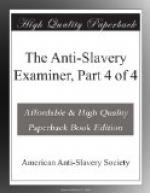[Footnote 2: Notes on Virginia, Boston Ed. 1832, pp. 169, 170.]
[Footnote 3: Minutes of the General assembly for 1818, p. 29.]
Is Jesus Christ in favor of American slavery? It is already widely felt and openly acknowledged at the South, that they cannot support slavery without sustaining the opposition of universal Christendom. And Thomas Jefferson declared, “I tremble for my country when I reflect that God is just; that his justice can not sleep forever; that considering numbers, nature, and natural means only, a revolution of the wheel of fortune, an exchange of situation, is among possible events; that it may become practicable by supernatural influences! The Almighty has no attribute which can take sides with us in such a contest."[4] And must we prove, that Jesus Christ is not in favor of what universal Christendom is impelled to abhor, denounce, and oppose; is not in favor of what every attribute of Almighty God is armed against?
[Footnote 4: Notes on Virginia, Boston Ed. 1832, pp. 170, 171.]
“Ye have despised the poor.”
It is no man of straw, with whom, in making out such proof, we are called to contend. Would to God we had no other antagonist! Would to God that our labor of love could be regarded as a work of supererogation! But we may well be ashamed and grieved to find it necessary to “stop the mouths” of grave and learned ecclesiastics, who from the heights of Zion have undertaken to defend the institution of slavery. We speak not now of those, who amidst the monuments of oppression are engaged in the sacred vocation; who, as ministers of the Gospel, can “prophesy smooth things” to such as pollute the altar of Jehovah with human sacrifices; nay, who themselves bind the victim and kindle the sacrifice. That they should put their Savior to the torture, to wring from his lips something in favor of slavery, is not to be wondered at. They consent to the murder of the children; can they respect the rights of the Father? But what shall we say of distinguished theologians of the north—professors of sacred literature at our oldest divinity schools—who stand up to defend, both by argument and authority, southern slavery! And from the Bible! Who, Balaam-like, try a thousand expedients to force from the mouth of Jehovah a sentence which they know the heart of Jehovah abhors! Surely we have here something more mischievous and formidable than a man of straw. More than two years ago, and just before the meeting of the General Assembly of the Presbyterian church, appeared an article in the Biblical Repertory,[5] understood to be from the pen of the Professor of Sacred Literature at Princeton, in which an effort is made to show, that slavery, whatever may be said of any abuses of it, is not a violation of the precepts of the Gospel. This article, we are informed, was industriously and extensively distributed among the members of the General Assembly—a body




